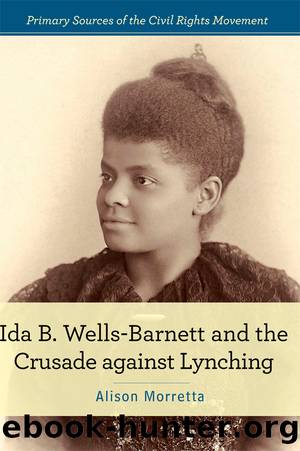Ida B. Wells-Barnett and the Crusade against Lynching by Alison Morretta

Author:Alison Morretta
Language: eng
Format: epub
Publisher: Cavendish Square Publishing, LLC
Published: 2018-02-02T00:00:00+00:00
Transatlantic Activism
Like many in the United States, the British believed the Southâs lies about black men. They also believed that lynching was a form of frontier justiceâa way to punish criminals in areas where there were no organized lawmen or courts. Wells hoped that by speaking the truth, she could show them that lynching was actually an illegal form of racial violence that stripped black Americans of their rights to a trial and protection under the law. She also believed that by reporting the facts, including cases where women and children were lynched, she could disprove the Southâs claim that lynching was a punishment reserved for black men who sexually assaulted white women.
During her six-week trip in 1893, Wells averaged a lecture a day. She traveled across England and Scotland, helping Impey and Mayo organize local chapters of the Society for Recognition of the Universal Brotherhood of Man (SRUBM). Wells gave lectures to members who then signed anti-lynching resolutions and petitions to the American government. Her travels were reported extensively in the British press.
Press coverage was mostly positive, but there were some naysayers. A city councilman wrote a letter to the Birmingham Daily Post, questioning the purpose of Wellsâs visit. He wrote, âI protest against being expected to give my attention to matters of municipal detail in a civilized country at a great distance,â and he felt it would be âan impertinenceâ for the English to interfere with American matters. Wells responded with her own letter, stating that the anti-lynching movement needed help from the British people, who âdid much for the final overthrow of chattel slavery ⦠America cannot and will not ignore the voice of a nation that is her superior in civilization, which makes this demand in the name of justice and humanity.â
Wells returned to Britain for a second tour in 1894, this time as the first black foreign correspondent for a white paper, the Chicago Inter-Ocean. It was a huge milestone for Wells to have the support of a white paper. She was paid for a weekly column, âIda B. Wells Abroad,â in which she could detail the events of her lecture tour for white readers. Her second trip was successful, but fraught with controversy.
Wells got caught in the middle of a petty feud between Impey and Mayo. When Wells refused to take sides, she was left without the support and funding of the SRUBM. She did not let this stop her, and she continued on her tour with the help of Reverend Charles Aked, a Liverpool pastor who helped her get speaking engagements and press coverage. The British Parliament held a dinner in her honor in London, and she met with many of the cityâs elite editors, ministers, lords, and ladies. By the end of her tour, a group of Londonâs most influential citizens formed the British Anti-Lynching Committee, dedicated to raising money and awareness for her cause.
Download
This site does not store any files on its server. We only index and link to content provided by other sites. Please contact the content providers to delete copyright contents if any and email us, we'll remove relevant links or contents immediately.
Saint José: Boy Cristero Martyr (Vision Books) by Fr. Kevin McKenzie(209)
New York-FM-blues by New York(197)
John Steinbeck by Milton Meltzer(172)
My Dear Older Sister 05 by Unknown(170)
Extraordinary Women In History: 70 Remarkable Women Who Made a Difference, Inspired & Broke Barriers by Leah Gail(167)
The Fun of It by Amelia Earhart(165)
Dodger's Guide to London by Terry Pratchett(164)
Harlem Renaissance Artists and Writers by Wendy Hart Beckman(163)
My Dear Older Sister 03 by Unknown(148)
My Dear Older Sister 06 by Unknown(146)
My Dear Older Sister 04 by Unknown(146)
100 Native Americans Who Shaped American History by Bonnie Juettner(145)
My Dear Older Sister 02 by Unknown(142)
Native Women of Courage by Kelly Fournel(139)
Girls Who Run the World by Diana Kapp(137)
The Epic Mentor Guide by Illana Raia(133)
My Dear Older Sister 09 by Unknown(133)
Taylor Swift by Kelly Spence(127)
Revolution in Our Time by Kekla Magoon(123)
